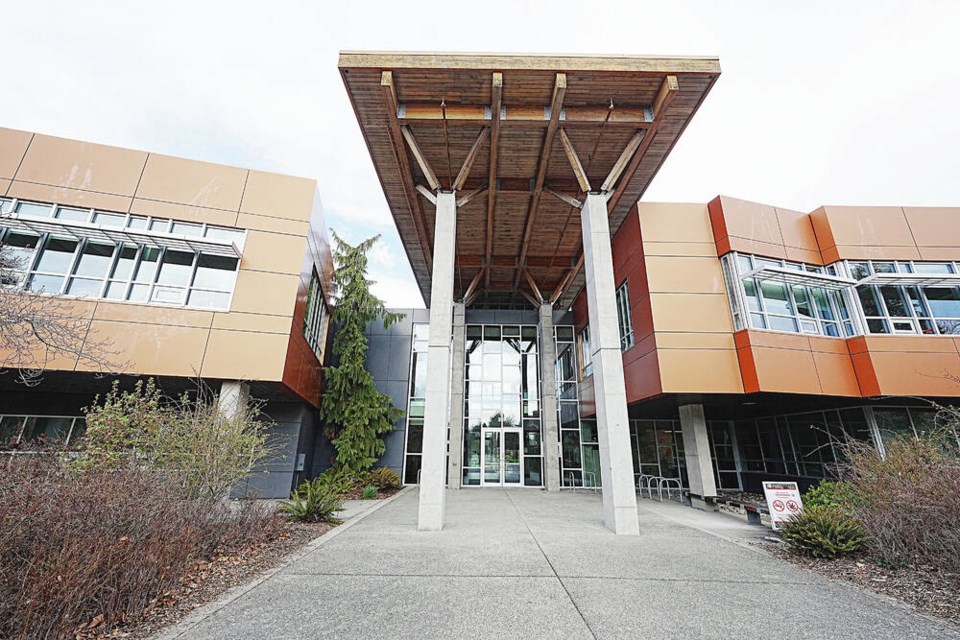Six unions from the University of Victoria presented a letter Monday urging the province to put an end to years of budget cuts.
The letter, handed to Post-Secondary Education Minister Lisa Beare when she visited the university to speak with student and faculty representatives, voiced concern about an estimated $13-million in the upcoming fiscal year that could see more than 100 positions eliminated across the university.
“Our workers and students should not be punished because of the inherent instability of our current post-secondary funding model, and poor management by UVic’s senior administration,” said the letter, signed by CUPE 917, CUPE 951, CUPE 4163, the Professional Employees Association (PEA), the UVic Faculty Association and the University of Victoria Students’ Society.
“While the current provincial budget is a minor step towards improving the funding, it is nowhere near the levels required to return to public funding that existed before 2000.”
Beare met with representatives of the two student unions on campus, as well as the faculty association.
UVic Faculty Association president Monica Prendergast said the minister made no commitments during their meeting, but the two parties were able to talk through some of the issues listed in the letter.
The letter calls for a funding review for post-secondary institutions that includes examination of rising senior administration costs, bridge funding to mitigate the impact of changes in international student enrollment, better accountability for funding allocations, and for the province to allow for budgetary deficits until international-student caps are lifted.
Prendergast noted that government support of post-secondary institutions has been declining over the past five decades to the point where it no longer makes up the majority of university revenue — dropping from 90 per cent provincial funding in the 1970s to only 41.4 per cent today.
Due to falling student enrolment, university departments are looking at four to six per cent budget cuts, but some could face up to 10 per cent budget reductions, she said. “When they say it’s four per cent across the board, it’s not true, because there will be some units that are going to get hit with eight per cent, 10 per cent — it could be much worse.”
The exact level of cuts, as well as how they will be distributed across UVic, is expected to be available in the next two weeks, she said.
“The climate that we’re in right now is just a lot of uncertainty,” she said. “Everyone’s exhausted.”
More and more professors are going on sick leave and an “undue amount” of faculty are on long-term disability, she said. “What I’m seeing is that people are at the end of their rope.”
Corbett Gildersleve, executive director of the University of Victoria Students’ Society, said the cuts will ultimately harm students, who will have fewer teaching supports, reduced maintenance on facilities, and fewer class offerings.
Students are already struggling with the affordability crisis, skipping meals, renting farther away from campus and having to miss out on study time, Gildersleve said.
When the student unions met with Beare, she touted the provincial government’s support for student housing and other government initiatives, he said. But Gildersleve said lack of core operational funding remains the key problem.
During their meeting, Beare agreed the ministry’s funding review process merits a further look, Gildersleve said. “They had some rounds of consultation during the pandemic period, but then it just got way quiet.”
The Ministry of Post-Secondary Education and Future Skills did not respond to questions on Monday. Beare was unavailable for comment.
Sam Montgomery, a labour relations officer with PEA, said the union, which represents about 1,200 employees at UVic, will continue to press Beare for a response to the letter’s demands in their next meeting on May 6.
“We are calling for emergency investments to stave off yet another round of layoffs at UVic,” she said.
Last year’s cuts, where UVic brought in an across-the-board four per cent reduction, was “absolutely devastating” for PEA members, she said.
Prendergast said she has been assured that no faculty layoffs will happen this year, but 35 faculty members have been targeted for “sometimes very lucrative” retirement incentives, she said.
She’s raised that as an issue with UVic. “Why are you offering incentives while at the same time mandating cuts across campus?” she said. “It just strikes me as a bit strange that in a budget-cut environment, they’re willing to hand out golden handshakes to only a select group of faculty.”
The university is trying to reduce the ranks of its senior academics, some of whom are well into their 70s, she said.
As of Monday, she’s signed off on six retirements.
UVic did not make anyone available for an interview on Monday.
A spokesperson said that university administration were not present at Beare’s campus meetings.
Asked about the letter, the spokesperson said the university is reviewing it but is not in a position to comment at this time.
UVic has about 5,000 employees and is one of the biggest employers on Â鶹´«Ã½Ó³»Island.
Note to readers: This story has been updated. A previous version gave an incorrect local for one of the CUPE unions.



